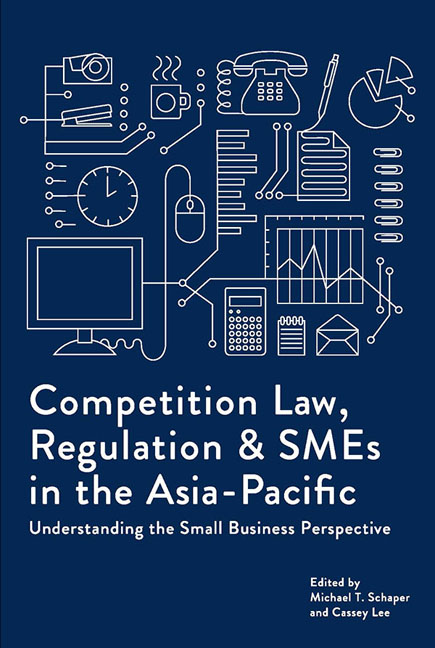 Competition Law, Regulation and SMEs in the Asia-Pacific
Competition Law, Regulation and SMEs in the Asia-Pacific Book contents
- Frontmatter
- Contents
- Foreword
- About the Contributors
- 1 Introduction: Making the Invisible SME More Visible in Competition Policy and Law
- Section 1 Theories And Basic Concepts
- Section 2 Smes And Competition Law
- 7 The Application of Per Ses to Smes: The Type 1 Error No One Notices?
- 8 Enforcing Competition Law Against SMEs: Presumptions and Problems
- 9 How Competition Law May Affect Franchised Smes in Apec Economies
- 10 Chinese Family Firms in Southeast Asia: Special Problems for Competition Law?
- 11 Trade Associations: Competition Law Advocates or Offenders?
- Section 3 Country Studies
- Index
8 - Enforcing Competition Law Against SMEs: Presumptions and Problems
from Section 2 - Smes And Competition Law
Published online by Cambridge University Press: 05 August 2017
- Frontmatter
- Contents
- Foreword
- About the Contributors
- 1 Introduction: Making the Invisible SME More Visible in Competition Policy and Law
- Section 1 Theories And Basic Concepts
- Section 2 Smes And Competition Law
- 7 The Application of Per Ses to Smes: The Type 1 Error No One Notices?
- 8 Enforcing Competition Law Against SMEs: Presumptions and Problems
- 9 How Competition Law May Affect Franchised Smes in Apec Economies
- 10 Chinese Family Firms in Southeast Asia: Special Problems for Competition Law?
- 11 Trade Associations: Competition Law Advocates or Offenders?
- Section 3 Country Studies
- Index
Summary
This chapter argues that, while some states in Southeast Asia favourably treat small and medium-sized enterprises (SMEs), competition enforcement in many other jurisdictions creates difficulties and disadvantages for them. Many different aspects of enforcement contribute to this. Most importantly, some young competition agencies tend to focus their enforcement efforts on SMEs with the presumption that SMEs are more likely to infringe the law due to their lack of understanding. In contrast, state-owned enterprises, which have a variety of opportunities to influence political figures and industry regulators, enjoy a measure of favouritism. SMEs also face difficulties in utilizing competition law to fight larger players, due to their limited financial resources, limited access to proper legal resources, and, sometimes, an inconsistent and non-transparent application of the law by some competition regulators.
Introduction
The treatment of small and medium-sized enterprises (SMEs) in competition law and policy has always been a contentious issue. SMEs in many countries have, for years, argued that they are placed at a disadvantage in the enforcement of competition law — if not within overall competition policy — and should thus be excluded from the ambit of the law. Some countries have chosen to exclude them from the ambit of the law, whilst others keep them within though subject to the de minimis test. Where SMEs are excluded from competition law, it usually takes the form of a blanket exclusion (such as occurs in Article 50 of Indonesia's Law No. 5 of 1999), although some partial exclusions may also be found. This chapter will examine some issues facing SMEs that arise from the enforcement of competition law, such as the presumption of a propensity to infringe the law, enforcement favouritism for large enterprises, the failure to create a level-playing field, and some other disadvantages faced by SMEs in enforcing their rights under competition law. For the purpose of this chapter, the notion of enforcement of competition law is used in its widest sense to include the enforcement of competition regulation by sectoral regulators; the term “competition authorities” here includes both sectoral and general regulators. The geographical focus is Southeast Asia.
The Presumption of Propensity
One common enforcement characteristic of competition authorities — and this is particularly true with young authorities — is to focus their enforcement efforts on SMEs.
- Type
- Chapter
- Information
- Competition Law, Regulation and SMEs in the Asia-PacificUnderstanding the Small Business Perspective, pp. 143 - 155Publisher: ISEAS–Yusof Ishak InstitutePrint publication year: 2016
